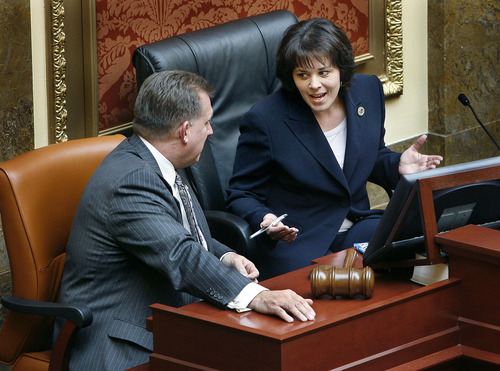This is an archived article that was published on sltrib.com in 2011, and information in the article may be outdated. It is provided only for personal research purposes and may not be reprinted.
The fallout from Sen. Curtis Bramble's omnibus immigration proposal continued to be felt Thursday throughout the Capitol as Gov. Gary Herbert praised the comprehensive bill while House Speaker Becky Lockhart and others vowed to fight to keep several single-approach House bills intact.
"What I've heard about [the Bramble bill], I think, incorporates my six principles and the Utah Compact principles, and I think that's a step in the right direction," Herbert said during his monthly KUED news conference. "I'm encouraged by what I hear."
Herbert outlined six guiding principles for the immigration debate last spring — largely reiterated by the Utah Compact that was signed by religious and business leaders. They include respecting the law and the humanity of people, accountability for business and empowering law enforcement.
But Lockhart, R-Provo, and House Majority Leader Brad Dee, R-Ogden, spoke in sharp defense of the work the House has done and vowed to stand up for those bills — including Rep. Stephen Sandstrom's enforcement-only bill and Rep. Christopher Herrod's employer-sanctions bill.
"We have members of our caucus who have worked upwards of a year and vetted and vetted with every partner and have taken input from every source to arrive at those bills," Lockhart said. "We will continue to do our work and we have done great work."
Senate Republicans huddled behind closed doors, discussing the immigration issue for more than an hour Thursday.
"We took a position that we didn't want to let an enforcement-only bill get through," said Senate Majority Leader Scott Jenkins, R-Plain City. "If we let an enforcement bill go through, we also wanted some sort of [guest] worker bill to go with it."
Jenkins, who appeared with Bramble at a Wednesday news conference to float the omnibus immigration bill, said he understands the House likes its stand-alone measures, but the issue has now largely shifted to the Senate.
"I'm not trying to offend them," Jenkins said. "[The bills] are in our body now, so we're going to handle them."
Sandstrom reiterated that he wants his bill to be independent of any omnibus bill and that it is entitled to a vote in the Senate.
Herrod, R-Provo, was more troubled. Earlier in the day, his bill that would penalize businesses — including potentially revoking their licenses — for hiring undocumented workers was moved into a committee that Bramble chairs, giving him considerable control over its fate.
"If Bramble wants to fight, I'm happy to take him on," Herrod said. "He's bullied representatives and this Capitol long enough."
The move came over the objections of Sen. Margaret Dayton, the chairwoman of the Senate Rules Committee, who has supported tough immigration proposals and is the Senate sponsor for Sandstrom's HB70.
For weeks, Bramble, R-Provo, has been trying to cobble together various competing immigration measures into an omnibus bill in an effort to avoid the stigma that Arizona has suffered after passing an enforcement-focused bill.
Meanwhile, Herbert said: "I believe, at the end of the session, we'll have a comprehensive immigration bill we'll all feel good about that is based on good principles and one that I will sign."
Bramble's bill is currently the only comprehensive measure proposed.
The proposed legislation, entitled the Utah Compact Bill, also drew criticism from Ron Mortensen, co-founder of the Utah Coalition on Illegal Immigration.
Mortensen said news of Bramble's bill and the moving of Herrod's measure to Bramble's committee "had the values-based 9/12 groups buzzing late into the night." Mortensen believes he can't control the loose coalition of enforcement-only supporters and tea party members.
He said anger toward Bramble — whom members have dubbed "Bramnesty" — is like a pot of boiling water.
"The lid is shaking around, at this point," Mortensen said.
Mortensen said the groups are calling for stand-alone bills to get hearings and floor votes. Absent that, he said it could make for an uncomfortable election cycle next year.
"It shouldn't be a threat," Mortensen said. "It's just a statement of how things will run if you get this large turnout at the caucus or the conventions."
Bramble's bill would include a state-based guest-worker program; require local law enforcement to check the immigration status of someone detained for a Class A misdemeanor or above; and impose sanctions on businesses that hire undocumented workers.
A Utah-based guest-worker permit — such as the one in Bramble's bill and in two separate measures, including Wright's HB116 passed by the House on Wednesday — would rely on the federal government to grant a waiver to its immigration-enforcement authority. No waiver mechanism currently exists in federal law. If one isn't granted, legislative lawyers say the courts would likely deem such a program unconstitutional.
The governor, who said he is "working behind the scenes to shape things as we see a need," said the comprehensive approach is worthwhile because it could prod Washington to act.
"Part of the frustration we're all feeling as people, as a state, is the lack of [action] by the federal government," Herbert said. "This will not only help us do what we can do as a state, but it will help us put pressure on the federal government … to say, 'You've got to act. You've got to start doing something.' "



